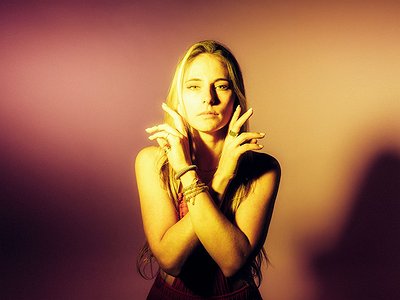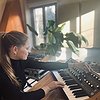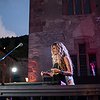Name: Natascha Polké
Nationality: Swiss
Occupation: Singer, songwriter, producer
Current release: Natascha Polké new single “Heavens Will Fall” is out now via [PIAS] Électronique. The Into You EP will follow on April 5th 2024.
Recommendations: I highly recommend the work of the painter Andy Denzler, particularly his 2010 series, ‘The Motion Paintings.’ Denzler's unique style, which blurs the lines between motion and stillness, captures moments of profound emotion and beauty.
If you have a curiosity about science and the unseen forces that shape our world, Water Sound Images by Alexander Lauterwasser is a fascinating read. The book delves into the research of Hans Jenny, offering a captivating exploration of how sound frequencies can influence water molecules to create intricate and mesmerizing patterns. It's a testament to the hidden symphony in nature and a beautiful intersection of science and art.
If you enjoyed this Natascha Polké interview and would like to keep up to date with her music, visit her on Instagram, Soundcloud, and Facebook.
When I listen to music, I see shapes, objects and colours. What happens in your body when you're listening? Do you listen with your eyes open or closed?
That's incredible! I totally get what you mean. When I listen to music, it's like a full sensory experience for me too, not just auditory but visual as well.
Different chords ignite different colors in my mind—A minor brings out a dark red, while D minor unfolds into a light blue. It's as if each song paints a vibrant canvas in my mind, with melodies and instruments weaving in and out.
Interestingly, I mostly listen with my eyes open. It might sound odd, but the visuals I see don't clash with the real world around me.
Entering new worlds and escapism through music have always exerted a very strong pull on me. What do you think you are drawn to most when it comes to listening to and creating music?
That's fascinating! My debut EP, Neverland delves right into this concept. For me, music is like a drug, a way to embark on journeys to places beyond our everyday reach. The track 'Neverland,' in particular, encapsulates this idea of musical escapism. I also made a a music video about it, trying to capture this idea.
Music, to me, is also about feeling emotions in their purest form, separate from real-life events. It allows for a full immersion into each emotion, free from any positive or negative associations, truly experiencing them in their rawest state.
What were your very first steps in music like and how would you rate the gains made through experience?
My journey into music started early, with violin lessons at 4 years old, under my grandmother's guidance.
Even before those lessons, I was composing on a xylophone, driven by a fascination with creating melodies. From the start, it was the melancholic tunes that captivated me the most, drawing me into their emotional depth.
This early passion for crafting melancholic melodies has remained at the core of my musical journey, shaping my artistic path. It’s like a constant thread that has woven through my growth as a musician.
According to scientific studies, we make our deepest and most incisive musical experiences between the ages of 13-16. What did music mean to you at that age and what’s changed since then?
It's interesting to reflect on that period of my life, especially considering the insight that our most profound musical experiences occur between the ages of 13 and 16.
For me, that was actually a time when I wasn't particularly immersed in music. Despite this, it was a phase of exploration—I was experimenting with being in bands, delving into genres like funk and soul, started taking singing lessons and even venturing into my first studio recordings. But I feel like I wasn’t connected that deeply to music during that time, I was so busy with school, friends and being a teenager.
It wasn't until I was 19 that I truly discovered what resonates with me in music—returning to the more melancholic tones that I was drawn to in my childhood.
How would you describe your own relationship with your instrument, tools or equipment?
My instruments are like a part of me, helping me turn my thoughts and emotions into music that I can share with everyone. They're incredibly important to me, to the point where I probably spend more time with them than with my friends—haha.
The Moog Sub 37 stands out as my favorite; it's the starting point for most of my productions. I absolutely love its rich, analog sound and versatility and I often use it to craft the core of my music, setting the tone for everything that follows.
[Read our feature on the Moog DFAM]
[Read our feature on the Moog Modular]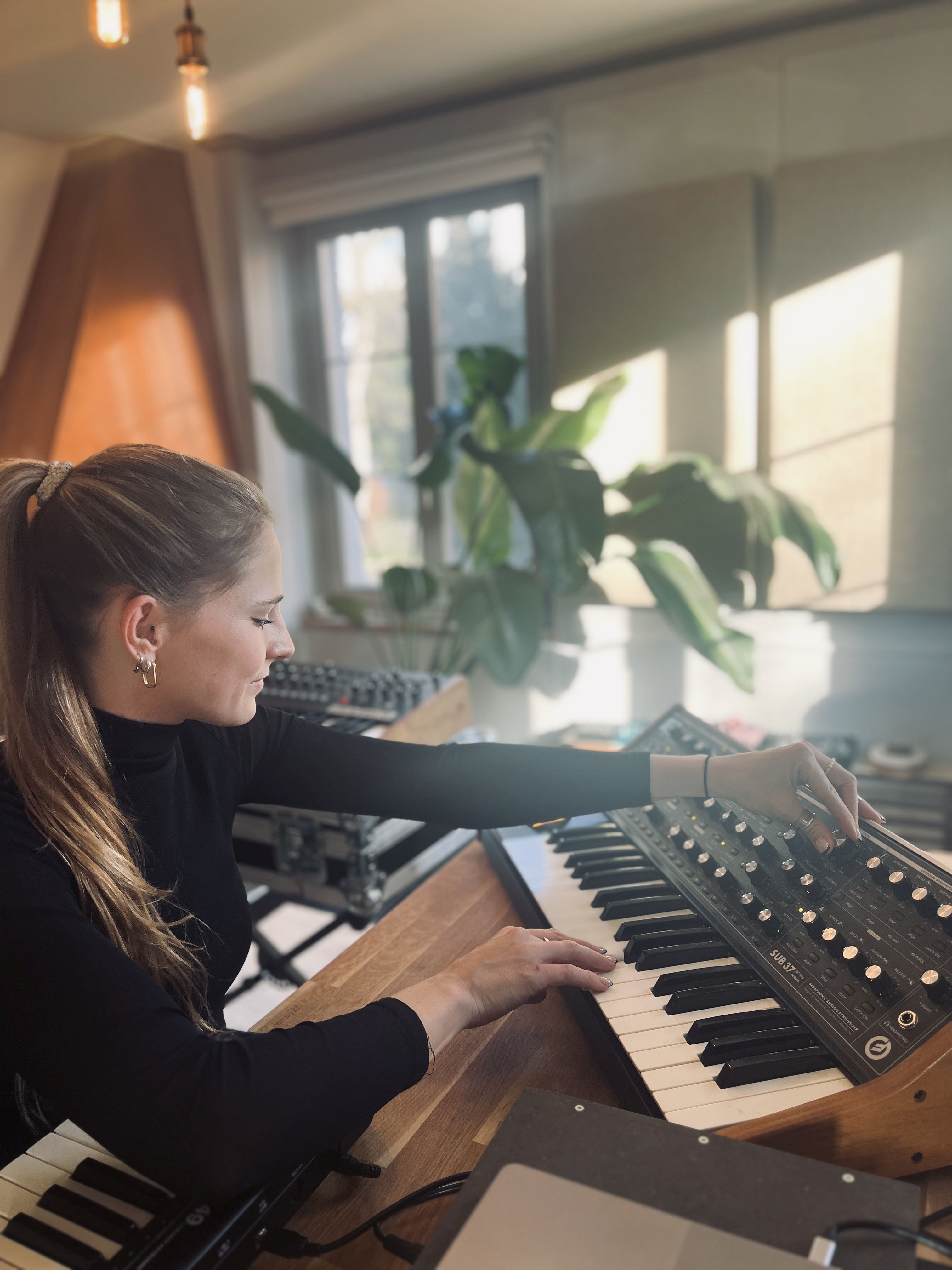
Natascha Polké Interview Image (c) the artist
Where does the impulse to create something come from for you? What role do often-quoted sources of inspiration like dreams, other forms of art, personal relationships, politics etc play?
For me, the urge to create is mostly fueled by strong feelings that need to be let out. I definitely consider myself an emotion-driven writer, focusing on personal experiences. I'm particularly drawn to crafting songs around thought-provoking themes with a dark edge, such as 'Loose Lips,' 'Poison of Choice,' and 'What if I’.
I am captivated by the challenge of weaving these thought-provoking ideas into creations that not only delve into darkness but also emerge with beauty, fragility, and relatability.
Take, for example, my song 'What if I’, featuring KIDSØ. It emerged from a place of exploring a daring, darker side of the self, and yet with the last line it turns it into something vulnerable.
What if I am the villain?
What if I am the foe?
What if I lose my senses?
Would you let it go?
[Read our KIDSØ interview]
Are you acting out parts of your personality in your music which you couldn't or wouldn't in your daily life? If so, which are these? What, would you say, are the key ideas behind your approach to music?
Wow I have to say I love your questions. This one followed me the whole day.
Interestingly, the core aspects of my personality contrast sharply with my music. I'm generally a very upbeat and energetic person, always in a good mood. On the other hand, my music carries a completely different vibe—it's enigmatic, dreamy, tinged with melancholy, and has a darker undertone
I guess music allows me to explore parts of myself that aren't as visible in everyday interactions and to dive into emotions that don’t often find expression in my day-to-day life.
If music is a language, what can we communicate with it? How do you deal with misunderstandings?
Music has the remarkable ability to convey an extensive range of messages, transcending cultural and linguistic barriers. It's a universal medium through which emotions, stories, and concepts can be shared across diverse audiences.
Since music can be interpreted in myriad ways depending on the listener's personal experiences, cultural background, and emotional state, misunderstandings are inevitable. I believe it's important to appreciate that each person might connect with your music in their unique way.
In crafting my lyrics, I often deliberately weave in multiple layers of meaning. Thereby I hope to spark various interpretations, allowing listeners to find their own personal connection to the songs.
Making music, in the beginning, is often playful and about discovery. How do you retain a sense of playfulness and how do you still draw surprises from tools, approaches and musical forms you may be very familiar with?
Keeping the music-making process playful and filled with discovery is a significant challenge, especially when under tight deadlines. I’m always scouting for new instruments and sounds, that spark this playfulness and curiosity in me.
For instance, I recently stumbled upon these beautiful sounding bells in a sound bath, which now form the cornerstone of the final single on my upcoming EP.
In one of the tracks I’m working on right now, I've mixed things up by integrating a chord trigger with my piano, forcing me out of my habitual chord progressions. This twist has injected so much fun into the process, rekindling the joy of playful experimentation.
Working with other artists has also been a great way to maintaining inspiration. These collabs not only bring new energy and ideas but also encourage creative exchanges that can lead to unexpected and exciting musical journeys. 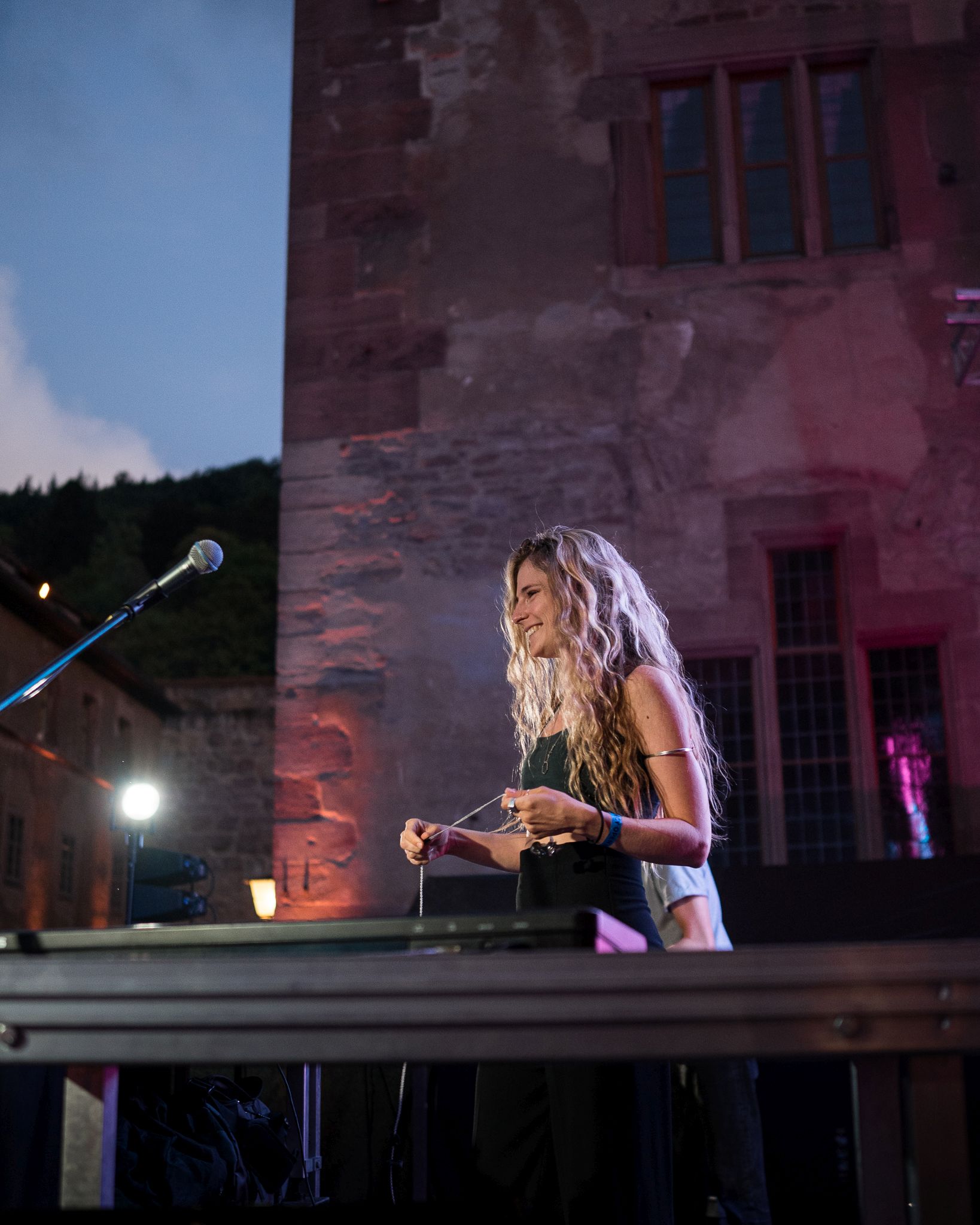
Natascha Polké Interview Image by Jan Hedlund
Sound, song, and rhythm are all around us, from animal noises to the waves of the ocean. What, if any, are some of the most moving experiences you've had with these non-human-made sounds? In how far would you describe them as “musical”?
Recently, someone shared with me a 30-minute recording of whale sounds, challenging me to incorporate it into a track. Listening to it was an incredibly profound experience. The sounds felt ancient and deeply moving, almost as if the whales had their own complex songs, complete with repeating sections.
Ultimately, I decided against adding any music to the recording. The whales' vocalizations were so complete and expressive on their own that adding other instruments seemed unnecessary. They already created a perfect piece of music by themselves. However, I would definitely love to experience these whale songs in person someday.
There seems to be an increasing trend to capture music in algorithms, and data. But already at the time of Plato, arithmetic, geometry, and music were considered closely connected. How do you see that connection yourself? What aspects of music do you feel can be captured through numbers, and which can not?
Your question touches on a fascinating intersection between music and mathematics. Personally I am very interested in this topic and even explored this through my Bachelor's thesis.
I delved into how music can create extraordinary patterns when put onto water or a plate dusted with sand. The patterns evolving from the music waves are reflective of those observed in the Milky Way, the complex structures of our DNA, or the unique designs in animal fur.
However, despite these astounding correlations, the core of music that emotionally engages me seems to defy reduction to numbers or algorithms. The profound impact of music, the kind that sends shivers down my spine or evokes deep feelings, cannot be distilled into simple numerical terms.
How does the way you make music reflect the way you live your life? Can we learn lessons about life by understanding music on a deeper level?
I would definitely say that the way I make music mirrors my life's philosophy—rooted yet restless, familiar yet frontier-seeking, always in pursuit of harmony.
As for whether understanding music on a deeper level can teach us about life, I believe it's not mandatory but it can be enlightening. Music shows us the dance between tension and resolution, and how different elements can harmonize, much like the experiences in our lives.
Engaging with music can highlight aspects of resilience, creativity, and unity, providing valuable lessons even in its simplicity.
We can surround us with sound every second of the day. The great pianist Glenn Gould even considered this the ultimate delight. How do you see that yourself and what importance does silence hold?
Well, whether this is an ultimate delight depends greatly on one's environment I would say. For instance, during the time I lived in London, the omnipresent noise often felt overwhelming. Now I live in Zurich near both the lake and the forest, and I really appreciate the mix of nature and city sounds.
Silence, to me, is very precious. With music filling so much of my life, those quiet moments are when I can truly recharge.
Do you feel as though writing or performing a piece of music is inherently different from something like making a great cup of coffee? What do you express through music that you couldn't or wouldn't in more 'mundane' tasks?
I actually see a profound similarity between the artistry in music and the craft of making an exceptional cup of coffee, especially when I listen to one of my best friends, who is among the top baristas in Switzerland, talk about his passion for coffee. I believe that anything can be elevated to an art form with the right mindset and a deep passion.
Yet, while both music and coffee can be seen as art forms born from dedication and passion, music uniquely explores a broader spectrum of human emotions. Coffee, with its comforting warmth, can uplift or soothe us, creating moments of contentment and pleasure.
Music, on the other hand, holds the power to not only comfort but also to provoke a wider array of feelings— from anger and sorrow to a profound sense of being understood and connected.
If you could make a wish for the future – what are developments in music you would like to see and hear?
Haha, this might be a bit of a long shot, but wouldn't it be incredible to have a program that could directly pull the musical ideas from my head?
Though, on second thought, that kind of technology would probably come with its own set of challenges.



